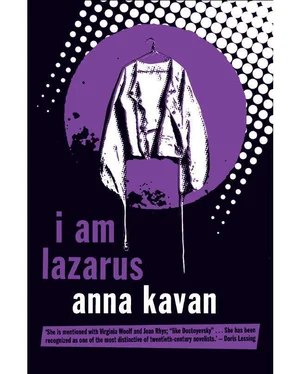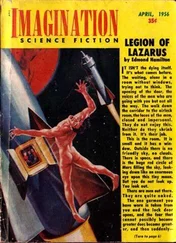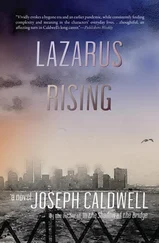Anna Kavan - I Am Lazarus
Здесь есть возможность читать онлайн «Anna Kavan - I Am Lazarus» весь текст электронной книги совершенно бесплатно (целиком полную версию без сокращений). В некоторых случаях можно слушать аудио, скачать через торрент в формате fb2 и присутствует краткое содержание. Год выпуска: 2013, Издательство: Peter Owen Publishers, Жанр: Современная проза, на английском языке. Описание произведения, (предисловие) а так же отзывы посетителей доступны на портале библиотеки ЛибКат.
- Название:I Am Lazarus
- Автор:
- Издательство:Peter Owen Publishers
- Жанр:
- Год:2013
- ISBN:нет данных
- Рейтинг книги:3 / 5. Голосов: 1
-
Избранное:Добавить в избранное
- Отзывы:
-
Ваша оценка:
- 60
- 1
- 2
- 3
- 4
- 5
I Am Lazarus: краткое содержание, описание и аннотация
Предлагаем к чтению аннотацию, описание, краткое содержание или предисловие (зависит от того, что написал сам автор книги «I Am Lazarus»). Если вы не нашли необходимую информацию о книге — напишите в комментариях, мы постараемся отыскать её.
Julia and the Bazooka
Asylum Piece
I Am Lazarus — читать онлайн бесплатно полную книгу (весь текст) целиком
Ниже представлен текст книги, разбитый по страницам. Система сохранения места последней прочитанной страницы, позволяет с удобством читать онлайн бесплатно книгу «I Am Lazarus», без необходимости каждый раз заново искать на чём Вы остановились. Поставьте закладку, и сможете в любой момент перейти на страницу, на которой закончили чтение.
Интервал:
Закладка:
The fact that the windows look out upon trees and gardens is part of the cruel design. For in this way I am sometimes tricked into forgetting the city; I fall into the trap of believing that I am free, that there is open country outside and not streets and ruins. And then comes the terrible moment when it occurs to me that the city is still there; and I pace from corner to corner, of course finding nothing, but still blindly searching for something that might not reject me, in the dreadful destitution of the condemned. How everything in the rooms jeers at me then. The walls shake with laughter. The painted houris sneer, curling their rosy lips at the idea that I should still be looking for mercy after all my misdeeds. Not even the sparrows that I've just fed with crumbs from the window restrain their ridicule, but fly away tittering. And the carpet, the blue carpet: the pale blue carpet finds it necessary to spread out its softness under my feet in sheerest derision.
VI
It's queer that I can't get out of the way of walking about. Here in the city, where few people except eccentrics ever walk unless forced to do so, I still don't seem to be able to break this countrified habit. A part of the distance between the cottage in which I sleep and the place where I work is occupied by an area without houses, a stretch of heath or rough parkland, where children play and dogs run about sniffing the grass. Every afternoon, for some time now, I've walked across this stretch of land which is partly wooded and partly covered with thickets of gorse and bramble. There's a pleasant path here that runs through the trees. At a particular turn of the path a silver birch bends over it, as if shaking out a threadbare green curtain.
To-day it was cooler and darker than usual under the trees. I stopped in an open clearing and looked up at the sky. The segment that lay behind me, towards the west, was full of a limpid light; the part ahead darkened softly with blowing clouds. Chromium against gunmetal, the barrage balloons on which the light fell embossed themselves on the tarnished shield of the sky. And above them, much higher up, so high as to seem no larger than a migration of birds, a huge formation of bombers was steadily travelling towards its distant night-time objective. Sometimes blurred, sometimes flashing with brightness, the machines in outlandish beauty pursued their lonely and awful course, filling the whole atmosphere with a muted thunder.
Why was it so dark and chilly down in the wood? I thought at first that I must be later than usual. And then it suddenly dawned on me that this hour which up to now had been afternoon had to-day slipped over the boundary into evening, and that the brown, scorched look of the trees came, not from drought, but from approaching winter. In the thinning foliage, here and there certain yellow leaves trembled and said ‘Death’ with a frightened voice.
A nondescript, paunchy man sauntered through the wood, whistling to a black dog. Then two very ordinary middle-aged people came round the curve under the silver birch. The man wore an officer's uniform, but was not at all martial looking: he held his cap under the arm farther from his companion, and from the hand at the end of this arm there dangled a string bag containing packages and a bottle of milk. His hair was grey and quite thin; his tunic did not fit very well and he seemed to sag a little at the knees as he walked. The woman with him looked like a housekeeper in a shapeless fawn coat and a serviceable brown hat that had never been gay. Quite suddenly and spontaneously these two people turned to one another and linked hands and walked on swinging their joined hands lightly and proudly between them, like young lovers. They could not repress the timid joy in their faces, and smiled at everything that they passed, at me, at the dog, at the trees. I began to make an effort to master myself as soon as I saw them, otherwise I must have burst into tears or thrown myself on the ground or started tearing my clothes with abandoned fingers. When one sees people like this so happy it is hard indeed to endure one's sentence. Why, even a paunchy, nondescript man has his black dog which accompanies him unquestioningly in faithful devotion wherever he chooses to go.
VII
Our city is full of the troops of a foreign army. When I first arrived here from the other side of the world I couldn't tell whether these soldiers were friends or invaders, and even now I'm equally at a loss.
Wherever money is being spent these men in their costly and elegant uniforms are to be found, in theatres, bars, restaurants, stores, buying the best of everything, and conducting themselves in a lavish way far beyond the resources of the citizens who are pushed quite into the background. Very often it's impossible to get what one wants — whether it's a meal or a drink or a seat at an entertainment or some article in a shop — because these people have bought up everything. And as for taxis and cars — well, the drivers seem to have placed their vehicles exclusively at the disposal of the foreign soldiers and their bottomless purses.
Are they, in fact, allies or enemies? Often enough one hears bitter remarks which suggest the latter alternative. But if that were the case wouldn't the hostility of the citizens take some more dynamic form than mere acrimonious grumbling? And then, it must be admitted, the conduct of the strangers isn't what one traditionally expects of a conquering army. Beyond the fact of their ubiquitousness and the way in which they monopolize all amenities, they appear not to interfere with our city at all. They have not, for example, taken over control of any of the public services or made any attempt to alter the laws or impose their own restrictions.
Occasionally, though this doesn't often happen, one sees them going about with the local people, usually girls they've picked up somewhere, or perhaps a youngster impressed by their spending powers. Or one catches sight of a group of their high-ranking officers formally escorted by a party of our dignitaries through the doors of a solemn official building.
One's natural impulse, of course, is to question somebody and settle things once and for all. But a person in my situation can't be too careful; I have to think twice about whatever I do, even about such a simple thing as asking a question. The last thing I want is to draw attention to myself in any way. And then, with our complex system of regulations, continually changing from day to day, how is one to know what is permitted? If I were to make a mistake the result might be fatal for me. A single false step might easily end in disaster. Besides, even if I were so reckless as to stop a passer-by and make my inquiry, how can I be sure that he'd give me an answer? As likely as not he would merely look at me suspiciously and pass on, even if he did not actually lodge a complaint against me. For a passionate secretiveness characterizes the inhabitants of our city. It simply isn't worth while taking such a chance. I'd rather remain uncertain.
It's not as if the foreigners were constantly being brought to my notice, either: in the way I live now, I often pass two or three days without seeing a single one of them.
In the beginning it was quite different. Before I was directed to the work which now occupies me, while I had time on my hands to wander about the city, I naturally gave a good deal of attention to the strange soldiers whom I saw everywhere lounging about, apparently as idle as I was myself. In those days I had some peculiar notions about them. Laughable as it may seem, I developed the idea that these men were in some way linked to me, that there was something in common between us, like a distant blood relationship. I, the city's outcast and prisoner, seemed to feel with these foreigners a connection, sympathetic perhaps, which did not exist where the citizens were concerned. Often, as I glanced at the strangers, their large, tanned, dispassionate, ruminative faces would touch some recollection in me; I would suddenly be reminded of the faces of friends in a far-distant country, the conviction would sweep over me that I was here confronting members of a race that had once been most dear to me, like brothers. And this emotion was so strong that it was all I could do to restrain myself from making an appeal of some kind to them, in my desolation.
Читать дальшеИнтервал:
Закладка:
Похожие книги на «I Am Lazarus»
Представляем Вашему вниманию похожие книги на «I Am Lazarus» списком для выбора. Мы отобрали схожую по названию и смыслу литературу в надежде предоставить читателям больше вариантов отыскать новые, интересные, ещё непрочитанные произведения.
Обсуждение, отзывы о книге «I Am Lazarus» и просто собственные мнения читателей. Оставьте ваши комментарии, напишите, что Вы думаете о произведении, его смысле или главных героях. Укажите что конкретно понравилось, а что нет, и почему Вы так считаете.












